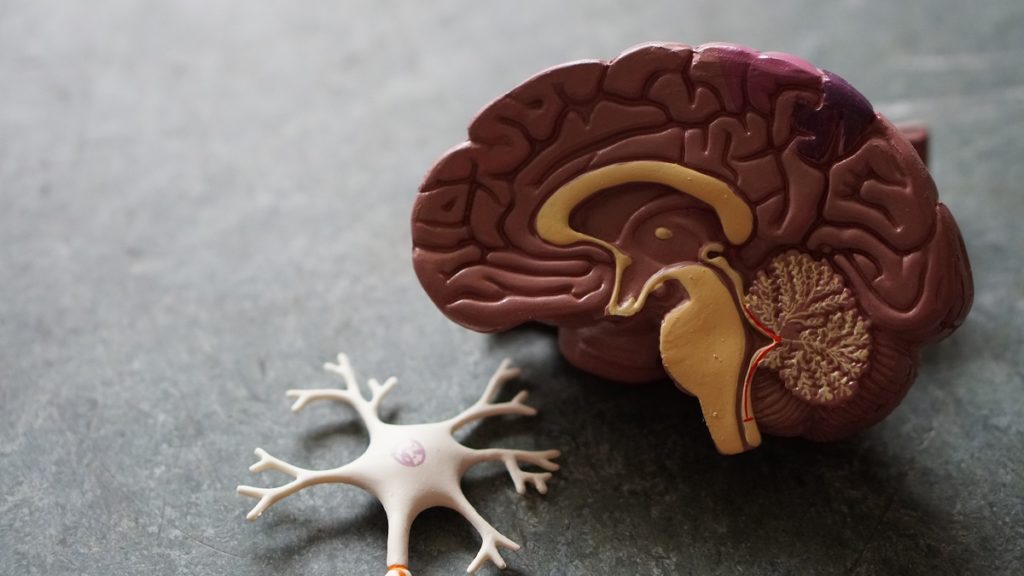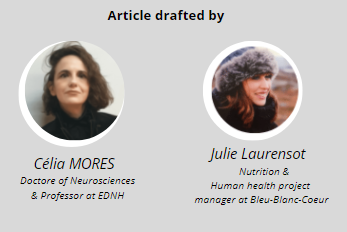The health benefits of polyunsaturated fatty acids and in particular omega-3 are well demonstrated in the scientific literature. Dr Celia Mores, Doctor of Neurosciences and also professor at the School of Dietetics and Human Nutrition (EDNH),, gives us here, a summary of the demonstrated benefits of omega-3, especially: DHA (docosahexaenoic acid) on our cognitive performance.
Why does our brain need omega-3?
Our brain integrates omega-3, mainly DHA, to function properly. It’s an important component of neurons which makes possible, in particular, to efficiently conduct nervous messages.
More precisely, the DHA’s role at the cerebral level is multiple:
![]() It gives flexibility to neuron’s membranes and facilitate the exchange of information from one neuron to another.
It gives flexibility to neuron’s membranes and facilitate the exchange of information from one neuron to another.
![]() DHA is also involved in the creation of new neurons and neurotransmitters (our nervous messengers).
DHA is also involved in the creation of new neurons and neurotransmitters (our nervous messengers).
![]() DHA also have an impact on the conduction of the nervous message from the brain to our peripheral organs by means of a sheath that surrounds the nervous fibers.
DHA also have an impact on the conduction of the nervous message from the brain to our peripheral organs by means of a sheath that surrounds the nervous fibers.

A crucial fatty acid even before birth
Many researchers have been interested in the impact of DHA on brain development of foetus, newborns, and subsequently young children. They also looked at adults (young and old), showing that a good intake could prevent the development of certain pathology (Alessandri etColl., 2004, 2008).
The most important period to bring polyunsaturated fatty acids, is the period during which the fetal nervous system is developping. This is, when the brain is most « greedy » in omega-3. It’s very important that the mother, during her pregnancy, includes it, in her diet, so that, there are no deficiencies. Indeed, several studies have shown that imbalances in lipids in the diet of the mother-to-be can generate, after birth, a reduction in visual acuity, cognitive disorders, such learning disorders and sometimes mental retardation (Hoffman et Coll., 2004; Innis,2005 ; Innis et Coll, 2008).

Omega-3 that shape our brain
Learning disabilities linked to a lack of DHA are thought to be due to changes in the cell membrane (they are less flexible) and to an alteration in the size and functioning of certain neurons involved in learning (located in the hippocampus (1)). A DHA deficiency also causes changes in various brain transmission circuits, notably that of acetylcholine, an important neurotransmitter for learning and memorization (2) (Ahmad et Coll., 2002; Muller et Coll., 2002; Togashi et Al.,1996).
It has also been shown in an experiment carried out on rats that consuming DHA can increase acetylcholine levels in the cerebral cortex and in the hippocampus, thus restoring learning capacities (Minami et Coll.,1997). Several experiments carried out since have demonstrated the beneficial effects of good DHA intake on cognitive performance.
For example, Dr. Lassek and his team have shown in children of school age an increase in reading, mathematics and science skills when there is an optimization of the intake of DHA and, at the same time, an increase in skills in reading, mathematics and science. decrease in the amount of omega-6 ingested (Lassek et Coll., 2011 to 2015). Benefits have also been shown on sustained attention and spatial planning during omega-3 supplementation (Jensen et Coll., 2010; Sheppard et Coll., 2013); the ability to place events in their context in children aged 7 to 9 was also studied: the performance for this type of memory, which is called “episodic”, was proportional to the amount of omega-3 consumed (Baym et Coll., 2014). So, all in all a lot of studies that link omega-3 consumption and improvement in cognitive performance, but does it work at all ages?
(1) The hippocampus is the brain structure involved in long-term learning and memorization
(2) Deficiencies of this neurotransmitter are observed in the elderly and more particularly those with Alzheimer’s
Omega-3 for mom, for baby, for dad and even grandpa!
The benefit of omega-3 intake remains valid, even if it occurs after birth and even in adulthood, including the elderly. This is what the study of soldiers (aged 20 to 54) deployed in Iraq shows (Johnston et Coll., 2013); the authors showed that the level of omega-3 in the blood of soldiers was correlated with better cognitive performance: flexibility, executive functioning. In another study, a regular intake of long-chain omega-3 DHA, EPA (eicosapentaenoic acid) in young Americans aged 18 to 25 produced signs of improvement in their working memory (3) (Narendran et Coll., 2012).
In the elderly, adequate dietary intake of omega-3 has been shown to limit cognitive decline and reduce physiological cerebral disturbances associated with aging. Thus, several epidemiological studies show that the absorption of omega-3 (through the consumption of fish, for example), reduces the risk of the appearance of dementia, in particular of the Alzheimer type (Kalmijn et Al., 1997; Kalmijn, 2000; Morris et Coll., 2003, 2005). We will talk about it again in a future article 😊.
(3) Working memory is involved in information processing, plan, organization, problem solving.

Where can we find DHA on our plates?
A DHA intake is therefore essential for brain development but it also plays an essential role in keeping a brain with well-oiled connections as long as possible. It should be consumed at least between 250 and 500 mg per day according to the recommendations of ANSES (French National Agency for Food, Environmental and Occupational Health Safety) and the National French Public Health Agency. Here are some ways to get your DHA fill up:
![]() Seafood: long chain omega 3s such as DHA are found in seafood, especially fatty fish. It’s advisable to avoid large predators in the sea and to prefer small fish, which are less affected by the accumulation of heavy metals. For our globall health, choose products from sustainable fishing that respect the seasonality of reproductive cycles. Here is a small selection to ask to the fishmonger’s: herring to spend the winter, mackerel from February and until the beautiful days of April, sardines are to be preferred from May to September; also think about trout in summer and more calamari / squid in the fall (they are not very fatty but they are very good fat!). Besides fresh produce, canned goods are also worth considering.
Seafood: long chain omega 3s such as DHA are found in seafood, especially fatty fish. It’s advisable to avoid large predators in the sea and to prefer small fish, which are less affected by the accumulation of heavy metals. For our globall health, choose products from sustainable fishing that respect the seasonality of reproductive cycles. Here is a small selection to ask to the fishmonger’s: herring to spend the winter, mackerel from February and until the beautiful days of April, sardines are to be preferred from May to September; also think about trout in summer and more calamari / squid in the fall (they are not very fatty but they are very good fat!). Besides fresh produce, canned goods are also worth considering.
Did you know? Bleu-Blanc-Cœur also has sea perspective and will soon offer fish! In these new sectors, Bleu-Blanc-Coeur is committed to more sustainability by requiring certified responsible fishing for wild marine fish and by feeding fish farmed aquaculture with less fishery products, without imported soybeans, and more plant diversity (vegetables, flax, etc.). To come soon! |
![]() Eggs from well-fed hens: The hen naturally stores DHA before laying because, if the egg is fertilized, the future chick will also need it for its nervous system. Thus, if a hen is fed enough omega-3, as is the case with Bleu-Blanc-Cœur laying hens, she stores an interesting quantity of DHA in her eggs (on average 160 mg for 2 eggs; this is is 0.5 to 2 times more DHA than eggs from other production way). More information here .
Eggs from well-fed hens: The hen naturally stores DHA before laying because, if the egg is fertilized, the future chick will also need it for its nervous system. Thus, if a hen is fed enough omega-3, as is the case with Bleu-Blanc-Cœur laying hens, she stores an interesting quantity of DHA in her eggs (on average 160 mg for 2 eggs; this is is 0.5 to 2 times more DHA than eggs from other production way). More information here .

Key messages to take away
The most useful omega 3 for our brain is DHA both for its development and for efficient transmission of nerve messages which is essential for learning.
DHA is essential for pregnant women and their babies since DHA intake during pregnancy has repercussions even after birth.
It is important to consume omega-3 and in particular DHA throughout life to optimize cognitive performance.
Note: The results published in the scientific literature may be contradictory. These results strongly depend on the different experimental conditions, the consumption declarations (often subjective) made by the volunteers and the neuropsychological tests chosen by the experimenters to measure cognitive performance.
Article written in collaboration with Célia MORES, Dr in Neurosciences and Julie Laurensot ( Nutrition & Human health project manager at Bleu-Blanc-Coeur ).







 Home
Home

